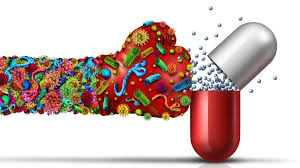By Felicia Imohimi
Stakeholders under the One-Health Platform say there is urgent need for bold, coordinated, sustained, cross-sectoral action to address Antimicrobial Resistance (AMR).
The stakeholders included the Veterinary Council of Nigeria (VCN), Chief Veterinary Officer of Nigeria (CVON), Nigerian Veterinary Medical Association (NVMA), Food and Agriculture Organisation (FAO), World Health Organisation (WHO), Ministry of Environment, among others.
They made the call at the on-going 2025 World Antimicrobial Resistance Awareness Week (WAAW) scheduled for Nov. 18 to Nov. 24 with the theme “Act Now: Protect, Protect Our Present, Secure Our Future.”
The News Agency of Nigeria (NAN) reports that AMR occurs when a normally active antimicrobial agent no longer shows activity against susceptible microbes, constituting threat to the control of emerging and increasing range of infections that result from microorganisms.
Dr Samuel Anzaku, the CVON, identified AMR as a global pressing issue posing significant threats to public health, food systems and the economy.
Anzaku listed main drivers of AMR in the country to include poor public awareness, inadequate healthcare infrastructure and unregulated antimicrobial use.
According to him, based on research findings, only 23.8 per cent of the public is aware of antibiotic resistance, 23.4 per cent of secondary facilities have functional microbiology labs.
He decried widespread misuse and overuse of antibiotics in human and animals.
The CVON identified AMR as “a One-Health challenge requiring urgent, bold and coordinated actions.
“This is because misuse of antimicrobials in humans, animals and crops is driving resistance, putting lives and livelihoods at risk, impacting food systems, economics and natural development as a whole.
“Solving this problem requires the collaboration of stakeholders under One-Health Platform.
“I urge farmers, veterinarians, healthcare professionals and policymakers to strengthen surveillance and invest in innovation, support initiatives to combat AMR in human health, animal health and environmental sectors.”
Also, Dr Pavel Ursu, WHO Representative and Head of Mission to Nigeria, identified AMR as a multidimensional health threat to modern medicine, Universal Health Coverage and health security gains, evolving rapidly, quietly and reversing decades of medical progress.
He said “AMR is threatening our ability to treat even the most common illnesses.
“Investment in AMR action is smart and an essential step towards a healthier and more secure future.”
Ursu said that the year’s theme underscored the urgent need for bold, coordinated, cross-sectoral action to address AMR as a present danger that demands immediate and sustained action.
Dr Oladotun Fadipe, the acting Registrar of VCN, said the annual global event remains an essential platform for uniting stakeholders to address the growing threat of antimicrobial resistance “an issue that endangers animal health, human health, food security, and our shared environment.
Fadipe, represented by Dr Helen Chime-Oputa, the Deputy Registrar, VCN, said antimicrobial resistance knows no boundaries, saying “our response must, therefore, be holistic, deliberate and driven by the One-Health approach.”
He reaffirmed the council’s commitment to promoting prudent use of antimicrobials in veterinary practice, enhancing professional competence and ensuring compliance with standards that safeguard public health.
He added that “as regulators, educators, and advocates, we recognise that veterinarians play a critical role in curbing AMR through appropriate prescription practices, biosecurity measures, and continuous engagement with livestock farmers, pet owners, and the wider public.
“We would continue to intensify capacity building, enforce best practices, and collaborate with government agencies, research institutions and international partners to strengthen Nigeria’s AMR response.
Dr Hussien Gadain, the FAO Country Representative in Nigeria and ECOWAS, said that the theme of the event was a reminder for urgent, coordinated action to safeguarding food, protecting livelihoods and ensuring sustainable food systems for future generations.
Represented by Dr Solomon Olorunleke, AMR Epidemiologist, Gadain said
Nigeria’s vast livestock industry plays pivotal role in ensuring food security, supporting rural livelihoods and driving economic growth.
He, however, said that disease pressures and misuse of antimicrobials contribute to rising AMR risks.
He identified strengthening good husbandry practices, vaccination, biosecurity and responsible antimicrobial use as essential to productivity, while preventing the emergence and spread of resistant pathogens across the livestock value chain.
He said “I reaffirm FAO’s commitment to supporting Nigeria’s One-Health agenda by strengthening AMR surveillance across sectors, promoting responsible antimicrobial use, improving biosecurity and building national and subnational capacity for AMR prevention and control.
“As we mark this year’s awareness week, FAO encourages stakeholders, including government agencies, farmers, veterinarians, plant health experts, environmental practitioners, academia and the private sector, to take concerted steps to mitigate AMR risks.
“By acting today, we protect Nigeria’s present and secure a healthier, safer and more resilient future for all.” (NAN)(www.nannews.ng)
Edited by Hadiza Mohammed-Aliyu












